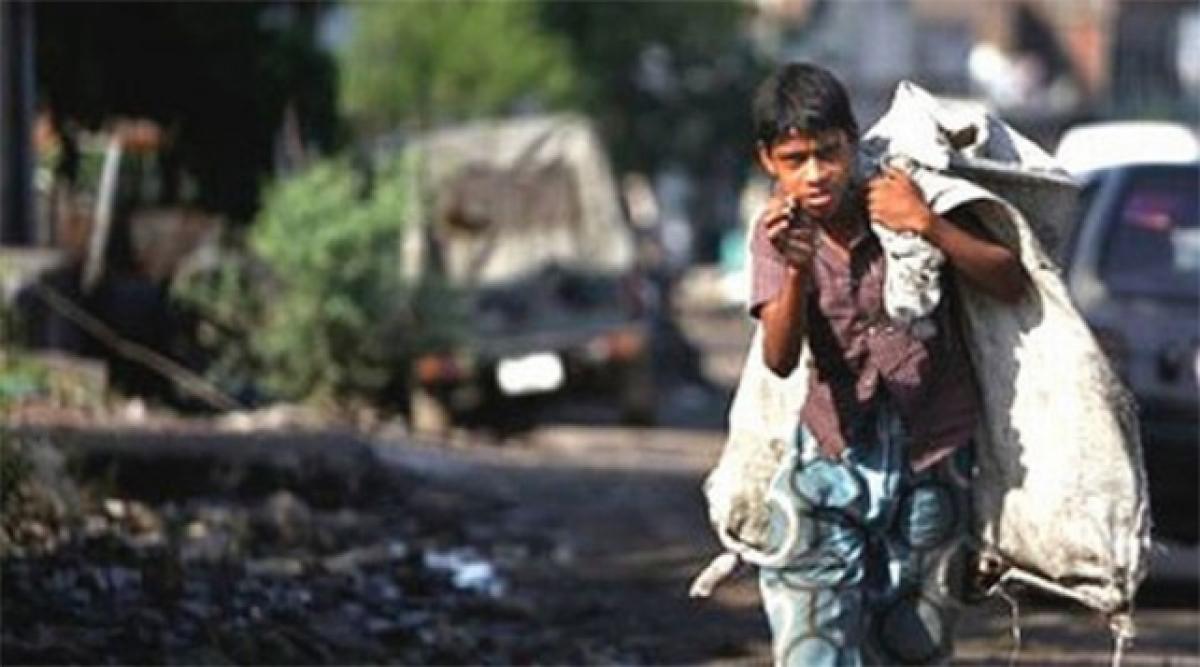Live
- Chanchalguda Jail Officials Say They Haven't Received Bail Papers Yet, Allu Arjun May Stay in Jail Tonight
- BJP leaders present evidence of illegal voters in Delhi, urge EC for swift action
- Exams will not be cancelled: BPSC chairman
- Nagesh Trophy: Karnataka, T.N win in Group A; Bihar, Rajasthan triumph in Group B
- YS Jagan condemns the arrest of Allu Arjun
- Economic and digital corridors to maritime connectivity, India and Italy building vision for future, says Italian Ambassador
- SMAT 2024: Patidar's heroics guide Madhya Pradesh to final after 13 years
- CCPA issues notices to 17 entities for violating direct selling rules
- Mamata expresses satisfaction over speedy conviction in minor girl rape-murder case
- Transparent Survey Process for Indiramma Housing Scheme Directed by District Collector
Just In

Amendments To Bill Will Legalise Child Labour, Fear Activists. The government has approved amendments to the Child Labour (Prohibition & Regulation) Amendment Bill that prohibits employment of children under 14 years in all occupations, allowing them to work in family enterprises and the audio-visual industry.
New Delhi: The government has approved amendments to the Child Labour (Prohibition & Regulation) Amendment Bill that prohibits employment of children under 14 years in all occupations, allowing them to work in family enterprises and the audio-visual industry. This has raised questions about children being deprived of education, increase in school dropout rates and the legalisation of child labour in specific industries.

Rallying against the amendments, scheduled to be tabled during the July-August monsoon session of parliament, child right activists fear that, if passed, it will "legalise" child labour in home-based enterprises and audio-visual entertainment industries.
"All forms of child labour up to 18 years of age should be prohibited; there should not be regulation of child labour," P. Joseph Victor Raj, national convenor, Campaign Against Child Labour (CACL), told IANS.
While approving amendments to the Bill on May 13, the government had said: "However, the prohibition will not apply if a child is helping his family or family enterprise, which is other than any hazardous occupation or process, after his school hours or during vacations."
An exception has been made for a child working as artist in an audio-visual entertainment industry, except in a circus, provided the child's school education is not affected.
"This will also deprive the children of enjoying the right to free and compulsory education, which was ensured by the Right of Children to Free and Compulsory Education Act, 2009, because allowing children to work before and after school hours will result in loss of interest in studies, drop-outs and tendency to continue working as child labourers," he added.
Social activist Swami Agnivesh told IANS: "This is a retrograde step being taken by the government," adding that with an amendment like this, the country was being taken back by decades.
Sanjay Gupta, director of NGO Chetna, agreed and said that the move would give rise to fake admissions in educational institutions.
"All you would then need to employ a child as a labourer would be a school certificate. Who would check if the child is actually attending school? Also, once it is passed, it is likely that the police and labour department would stop taking action, saying that child labour was now allowed," Gupta told IANS.
According to Census 2011 figures, India has 10.12 million child labourers aged between five and 14 years. An International Labour Organisation (ILO) report said that almost 17 million children between five and 17 are engaged in child labour in South Asia - and one in five of these are aged 11 or under.
The report, "Measuring children's work in South Asia:
Perspectives from national household surveys", revealed that of these child labourers, 5.8 million were in India, the highest in the region. This is followed by five million in Bangladesh, 3.4 million in Pakistan and two million in Nepal.
The government had said in approving that a child can help his family or family enterprise, it was striking a balance between the need for education and the reality of the country's socio-economic condition and social fabric.
"No work is non-hazardous for children. Any work will be detrimental to their health and will affect their education and leisure time. There have been instances of long hours of work and child sexual abuse in the entertainment industry," Raj added.
An analysis of census data by NGO CRY (Child Rights and You) revealed that child labour has been decreasing at a mere 2.2 per cent per year over the last ecade, contrary to popular perception of its substantial reduction.
The report also said that at this pace, it would take more than a century to end the menace, adding that child labour in urban areas in the country has increased by 53 per cent over 2001-2011.
The changes in the law, however, provide for stricter punishment for employers for violations. While there is no penalty provision for parents for the first offence, the employer would be liable for punishment even for the first violation.
Suggesting measures, Gupta said the government could instead look at providing children with life skills at schools, where they are also taught about laws and rights.
"At such places, children can be taught in a conducive environment without being exploited," he said and added that while there should be a blanket ban on child labour up to the age of 14, those between 15 to 18 years can be taught skills in formal school set ups.

© 2024 Hyderabad Media House Limited/The Hans India. All rights reserved. Powered by hocalwire.com







